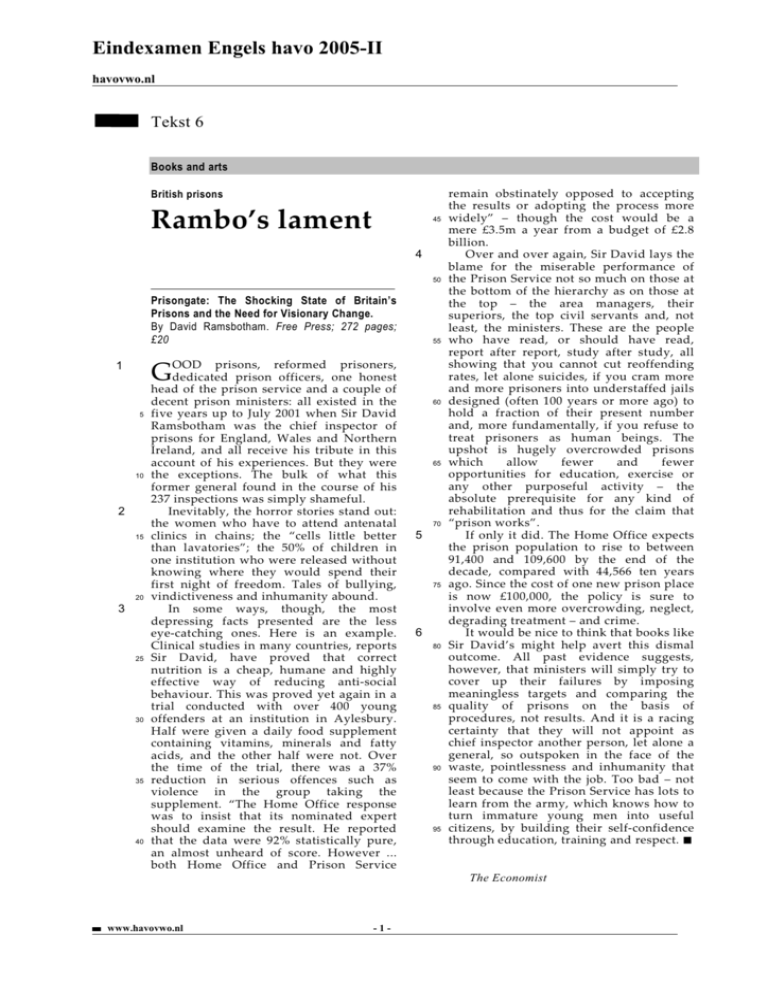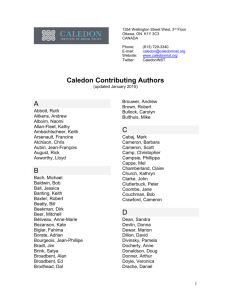Rambo's lament
advertisement

Eindexamen Engels havo 2005-II havovwo.nl Tekst 6 Books and arts British prisons Rambo’s lament 45 4 50 Prisongate: The Shocking State of Britain’s Prisons and the Need for Visionary Change. By David Ramsbotham. Free Press; 272 pages; £20 55 OOD prisons, reformed prisoners, G dedicated prison officers, one honest head of the prison service and a couple of 1 5 10 2 15 20 3 25 30 35 40 decent prison ministers: all existed in the five years up to July 2001 when Sir David Ramsbotham was the chief inspector of prisons for England, Wales and Northern Ireland, and all receive his tribute in this account of his experiences. But they were the exceptions. The bulk of what this former general found in the course of his 237 inspections was simply shameful. Inevitably, the horror stories stand out: the women who have to attend antenatal clinics in chains; the “cells little better than lavatories”; the 50% of children in one institution who were released without knowing where they would spend their first night of freedom. Tales of bullying, vindictiveness and inhumanity abound. In some ways, though, the most depressing facts presented are the less eye-catching ones. Here is an example. Clinical studies in many countries, reports Sir David, have proved that correct nutrition is a cheap, humane and highly effective way of reducing anti-social behaviour. This was proved yet again in a trial conducted with over 400 young offenders at an institution in Aylesbury. Half were given a daily food supplement containing vitamins, minerals and fatty acids, and the other half were not. Over the time of the trial, there was a 37% reduction in serious offences such as violence in the group taking the supplement. “The Home Office response was to insist that its nominated expert should examine the result. He reported that the data were 92% statistically pure, an almost unheard of score. However ... both Home Office and Prison Service 60 65 70 5 75 6 80 85 90 95 remain obstinately opposed to accepting the results or adopting the process more widely” – though the cost would be a mere £3.5m a year from a budget of £2.8 billion. Over and over again, Sir David lays the blame for the miserable performance of the Prison Service not so much on those at the bottom of the hierarchy as on those at the top – the area managers, their superiors, the top civil servants and, not least, the ministers. These are the people who have read, or should have read, report after report, study after study, all showing that you cannot cut reoffending rates, let alone suicides, if you cram more and more prisoners into understaffed jails designed (often 100 years or more ago) to hold a fraction of their present number and, more fundamentally, if you refuse to treat prisoners as human beings. The upshot is hugely overcrowded prisons which allow fewer and fewer opportunities for education, exercise or any other purposeful activity – the absolute prerequisite for any kind of rehabilitation and thus for the claim that “prison works”. If only it did. The Home Office expects the prison population to rise to between 91,400 and 109,600 by the end of the decade, compared with 44,566 ten years ago. Since the cost of one new prison place is now £100,000, the policy is sure to involve even more overcrowding, neglect, degrading treatment – and crime. It would be nice to think that books like Sir David’s might help avert this dismal outcome. All past evidence suggests, however, that ministers will simply try to cover up their failures by imposing meaningless targets and comparing the quality of prisons on the basis of procedures, not results. And it is a racing certainty that they will not appoint as chief inspector another person, let alone a general, so outspoken in the face of the waste, pointlessness and inhumanity that seem to come with the job. Too bad – not least because the Prison Service has lots to learn from the army, which knows how to turn immature young men into useful citizens, by building their self-confidence through education, training and respect. The Economist www.havovwo.nl -1- Eindexamen Engels havo 2005-II havovwo.nl Tekst 6 Rambo’s lament 1p 20 A B C D 1p 21 A B C D 3p 22 1p 23 A B C D Which of the following is true according to paragraph 1? In his book about the state of Britain’s prisons, Sir David Ramsbotham explains what improvements were made while he was supervisor. praises positive achievements but is generally very critical. states that conditions in prisons have become a lot worse since he resigned. stresses the poor quality of the prison system and ignores its successes. What is the function of paragraph 2? To add some more examples to those given in Sir David’s book. To criticise the style in which Sir David’s book is written. To express disbelief at the facts presented in Sir David’s book. To illustrate the kind of tragedies highlighted in Sir David’s book. Geef voor elk van de onderstaande beweringen aan of deze wel of niet in overeenstemming is met de inhoud van alinea 3. 1 De Britse overheid staat afwijzend tegenover een bewezen goede en goedkope manier om gedragsproblemen onder gevangenen te verminderen. 2 De Prison Service en het verantwoordelijke ministerie verschillen met elkaar van mening over het gevangenisbeleid. 3 De regering laat proeven uitvoeren op gevangenen zonder dat ze dit zelf weten. 4 De situatie in Britse gevangenissen verschilt sterk van die in andere landen. 5 Jonge criminelen zijn gemakkelijker op het rechte pad te brengen dan oudere. Noteer het nummer van elke bewering, gevolgd door “wel” of “niet”. “These are ... human beings.” (lines 54-63) How could this sentence also begin? But, these are... Indeed, these are... In short, these are... Moreover, these are... 1p 24 Welke factor vormt de meest wezenlijke belemmering voor een effectief gevangenisbeleid volgens “you cannot ... human beings” (regels 57-63)? 1p 25 What is the point made in paragraph 5? The authorities have good reasons for becoming stricter and stricter. The government doubts the effectiveness of its own crime policy. The present prison policy is bound to be counterproductive. The prison system will soon become too expensive. A B C D 1p 26 A B C D 1p 27 A B C D What feeling does the writer of this article express in lines 79-86 (“It would ... not results.”)? Hope. Indifference. Pessimism. Surprise. Who does the writer of this article mainly criticise in paragraph 6? Sir David Ramsbotham. The British army. The British government. The Prison Service. www.havovwo.nl -2-
